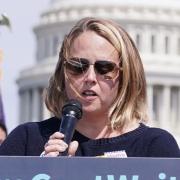While I’m at work writing to you, my husband is home taking care of our four-month-old daughter. After my three months of paid leave were up, he started his three months of paid family leave to stay home and care for our second baby like he did with our first.
I know, right? We’re both lucky to work for employers that provide paid family leave. So lucky that I feel torn between shouting from the rooftops my personal ode to paid leave and how it has benefited our family, and keeping it to myself  because so few families receive this vital support that it feels like I'm bragging.
because so few families receive this vital support that it feels like I'm bragging.
At MomsRising we frequently hear from our members about the need for all families to have access to paid family leave. In fact paid family leave was one of the top issues MomsRising members wanted addressed in the State of the Union.
Join us in shouting from the rooftops that EVERYONE needs access to paid family leave when new children arrive! Congress needs to hear from you! Add your signature here: http://action.momsrising.org/sign/pfl_petition/
Having access to paid family leave shouldn’t have anything to do with luck. It’s good for moms, dads, and babies and, as a new study shows, paid family leave is a sweetheart deal for the economy and taxpayers too.
Paid family leave, good for the economy?
Yes! Paid family leave is a win-win. Recent research from the Center for Women and Work at Rutgers shows, controlling for other factors that affect leave-taking, among new parents who took paid family leave after the birth of a child:
- Women who took paid leave are 39% less likely to receive public assistance [1]
- Women who took paid leave were 40% less likely to receive food stamps in the year following their child’s birth when compared to those did not take any leave [2]
- Women and men who took paid family leave were less likley to rely on public assistance after the birth of their child, compared to those who did not take any leave [3]
- Women who took a paid leave were more likely to be working 9-12 months after a child’s birth than those who did not take any leave [4]
- And women who took a paid leave report increases in wages within a year of their child's birth compared to those women who did not take any leave [5]
Study author Linda Houser notes: “While we have known for a long time about the maternal and infant health benefits of leave policies, we can now link paid family leave to greater labor force attachment and increased wages for women as well as to reduced spending by businesses in the form of employee replacement costs, and by governments in the form of public assistance.”
That is some sweet news! And good timing too, because for the first time in history, women comprise half of the paid labor force, three-quarters of moms are in the labor force and the majority of families need two working parents to make ends meet. This and the fact that over 80% of women in our nation have children by the time they are 44 add up – and you can see why this should be the priority issue for Congress that it is for our MomsRising members. It is long past time for our public policies to catch up to the modern realities of today's families.
*Sign our petition to Congress to support paid family leave policies for families! We’ll deliver your signatures to elected officials ASAP along with the message that paid family leave is a neccesity and we can’t afford to wait! http://action.momsrising.org/sign/pfl_petition/
Why is paid family leave so important?
Paid family leave after the birth of a child helps give kids a healthy start in life and gives their families the economic security they need to stay out of poverty at a critical time. At the same time it can benefit businesses’ bottom line. This saves everyone--from parents to taxpayers to businesses--money in the long run.
Studies show that paid family leave after the birth of a child combats poverty, gives children a healthy start, lowers infant mortality by more than 20% [6] and helps lower the wage gap between women and men. [7]
Yet, in the United States, only 49% of mothers are able to cobble together paid leave by using sick days, vacation days, disability leave, and maternity leave. And 51% of new mothers lack any paid leave -- so some take unpaid leave, some quit, some even lose their jobs just when they need them the most. [8] No wonder having a baby is a leading cause of "poverty spells" in our nation!
In addition, a number of studies have shown that maternity leave has a positive impact on how long women breastfeed, which in turn affects the long-term health of mother and child. This is important because major medical authorities recommend that infants be breastfed exclusively for their first six months. Despite the government's Healthy People 2010 breastfeeding goals, only 13.6% of U.S. infants are breastfeeding exclusively and only 43% are breastfeeding at all at six months of age. [9] Recently the U.S. Surgeon General called paid family leave policies important for families and babies’ health – linking the ability of new moms to take paid leave to increased rates of breastfeeding. [10]
Paid leave benefits dads too: studies show that while not all dads have access to paid leave, fathers who are able to take paid leave to care for their children are more involved in their kids’ lives nine months after the children are born and are less likely to rely on public assistance. [11, 12]
Paid family leave isn’t just good for families – it also benefits employers. A 2011 study of the California Paid Leave program showed that most employers found that the Paid Family Leave had a positive effect on productivity, profitability/performance, turnover and employee morale. [13]
177 countries have some form of paid leave for new moms after the birth of a child. Sadly, the U.S. isn't one of them, setting up our families for failure. [14] We can do better.
*Join us in showing Congress that paid family leave is a necessity for ALL moms, dads, babies, tax-payers and the economy! Sign our petition calling on Congress to support paid family leave policies that make America’s families stronger! http://action.momsrising.org/sign/pfl_petition/
And please use the Share buttons below to share this with three or more friends you think might like to take action too.
Together we’re a more powerful voice for women and families.
P.S. MomsRising is working with our friends at the National Partnership for Women and Families and Working Mother Media to deliver this petition to Congress to encourage them to support paid leave for families.
P.P.S. Can you take a moment to share your experiences with family leave (or your experiences with a lack of family leave)? What did you--or your friends or family members--do when a new child arrived? http://www.momsrising.org/member_stories/topic/paid-family-leave-stories_1/submit/mrstory/paid-family-leave
[1-5] Linda Houser, PhD “Pay Matters: The Positive Economic Impacts of Paid Family Leave for Families, Businesses and the Public,” A Report for the Center for Women and Work, January 2012
[7] Waldfogel, Jane “Understanding the 'Family Gap' in Pay for Women with Children," Journal of Economic Perspectives 12, no. 1 (1998), 137-156
[8] Bureau of Labor Statistics Press Release: Employment Characteristics of Families 2009, May 2010
[9] Centers for Disease Control, Breastfeeding Report Card—United States 2010
[11] Paternity Leave and Fathers’ Involvement With Their Young Children. Lenna Nepomnyaschy and Jane Waldfogel. Community, Work, and Family, 2007.
[12] Linda Houser, PhD “Pay Matters: The Positive Economic Impacts of Paid Family Leave for Families, Businesses and the Public,” A Report for the Center for Women and Work, January 2012



The views and opinions expressed in this post are those of the author(s) and do not necessarily reflect those of MomsRising.org.
MomsRising.org strongly encourages our readers to post comments in response to blog posts. We value diversity of opinions and perspectives. Our goals for this space are to be educational, thought-provoking, and respectful. So we actively moderate comments and we reserve the right to edit or remove comments that undermine these goals. Thanks!